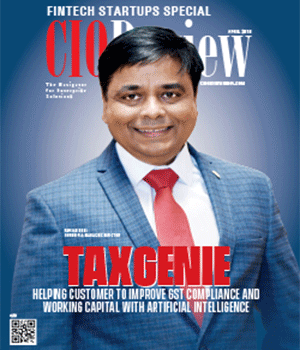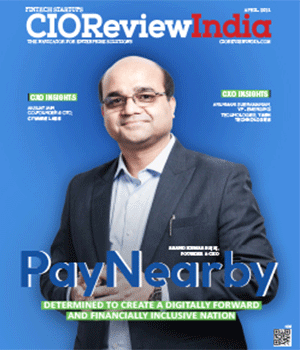
Fintech: Emerging Fintech Trends To Watch Out For In 2020
Sourabh Chatterjee, President & Head - IT, Web Sales & Travel, Bajaj Allianz General Insurance | Wednesday, 11 March 2020, 04:39 IST
 About a decade ago, FinTech was as fancy a word as you could get but today, it frames a picture worth billions of dollars and millions of jobs. It is not longer a fancy word that promises euphoric stuff but fails to deliver anything. Over the past few years, Fintech has steadily seen relevance creep in and financial organisations have started adopting technology as a de facto choice. Technology has also matured over a period to form stable offerings that provide benefits right from day one of going live. Some technologies have grown and mutated while others are still in the hunt for maturity. Every domain has its relevant and irrelevant parts and I will only write about the general insurance domain to make it super relevant to my sphere of work.
About a decade ago, FinTech was as fancy a word as you could get but today, it frames a picture worth billions of dollars and millions of jobs. It is not longer a fancy word that promises euphoric stuff but fails to deliver anything. Over the past few years, Fintech has steadily seen relevance creep in and financial organisations have started adopting technology as a de facto choice. Technology has also matured over a period to form stable offerings that provide benefits right from day one of going live. Some technologies have grown and mutated while others are still in the hunt for maturity. Every domain has its relevant and irrelevant parts and I will only write about the general insurance domain to make it super relevant to my sphere of work.
In an insurance company, certain activities are assumed or taken for granted; tasks like filling in proposal forms, paying for your policy, getting the right communication about your policy and the need to get a claim registered for a payout. The Insurance Value Chain is all about the customer lifecycle from prospecting to renewals and claims. Here's a list of technologies that would find mention in almost every general insurer's to-do list this year:
“Analytics gives birth to a lot of insights that can help with typical challenges in pricing strategies, claims processing, fraud identification, underwriting decisions, promotions and campaigns, risk selection and even process optimisation”
1. Cloud adoption: Cloud is not a new technology nor are its secrets unknown. Organisations that attempt to move to the cloud move partial workloads in an attempt to cut down on costs that are recursively biting. However, moving to cloud is not a silver bullet. Careful planning and organised movement is every bit as important as the choice of a cloud partner. Cost savings is just the first part, the cloud can be a big boost for customer-experience, improve the way data is utilised in core as well as non-core systems and also pave way for a brilliant claims experience.
2. Information security: If there is one word that keeps all CIOs and CISOs awake, it is the ever present security risk to the enterprise systems. Insurance companies have a tightrope to walk in offering hyper-personal customer experience while acting as a custodian to all the Customer data; and all this while working on really tight budget. An insurance company thrives on the trust of its customers and protection of digital assets is a high priority. Various initiatives in the digital security area including Ransomware prevention, Phishing attack mitigation measures & SecOps will create the largest impact.
3. AI, ML & RPA: Artificial Intelligence & Machine Learning have been the “in” technologies for the last few years. Advances in computing, algorithms and model training techniques have resulted in massive proliferation of this stream. Most insurers are either experimenting or finding the right use cases for harnessing the benefits of this technology. One of the biggest challenges will be getting the accuracy tuned to derive maximum benefit. From image analytics to fraud detection and even predictive security are some of the common use cases that Insurers have been playing around with.
4. Automation using RPA: Insurance operations have a lot of manual, repetitive and manpower intensive tasks that cost a lot in terms of time and money. Modern RPA solutions offer just the right tools to help resolve one of the biggest challenges in an insurance company; linear manpower scaling. Processing documents, approval workflows and even decision making are some of the most commonly utilised features of any RPA solution.
5. Blockchain: For long, blockchain has been elusive in terms of getting a right use case but, the advantage offered by a blockchain makes it a de-facto choice when it comes to offering services with an ecosystem. An immutable, replicated, controlled and governed ledger with advantage of a Smart Contract can actually replicate the workings of a core system. There are various kinds of blockchain initiatives globally available but almost all of them depend heavily on acceptance and presence of participants or peers. This aspect alone makes blockchain a valuable treasure that remain unexplored.
6. Bigdata Analytics: Insurance is all about data and huge volumes of data. Typically, data is available in all kinds of flavours; transactional, behavioural, underwriting, structured, unstructured, document based, image based, video based, voice based and even composite forms. Data is the new oil and like oil, you have to mine it, refine it and consume it to benefit from it. Analytics gives birth to a lot of insights that can help with typical challenges in pricing strategies, claims processing, fraud identification, underwriting decisions, promotions and campaigns, risk selection and even process optimisation.
CIO Viewpoint
Fintech: Emerging Fintech Trends To Watch Out...
By Sourabh Chatterjee, President & Head - IT, Web Sales & Travel, Bajaj Allianz General Insurance
By Ann Winblad, Co Founder, Hummer Winblad Venture Partners
Changing Times in for Financial Technologies
By Rajeev Bhatia, Head IT, NSDL Payments Bank
CXO Insights
How Financial Services Companies Are Striving...
By Jyoti Prakash, Regional Sales Director, India & SAARC Countries, Splunk
RPA In Action In The Financial Sector
By Pavan Kishore Kota Subramanya, Director, Intelligent Automation, Fiserv
Innovation is the Key Factor for Fintech to...




.jpg)
.jpg)



